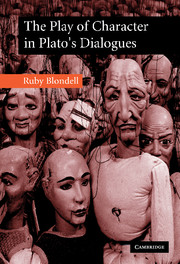Book contents
- Frontmatter
- Contents
- Preface
- 1 Drama and dialogue
- 2 The imitation of character
- 3 The elenctic Sokrates at work: Hippias Minor
- 4 A changing cast of characters: Republic
- 5 Reproducing Sokrates: Theaetetus
- 6 Putting Sokrates in his place: Sophist and Statesman
- Bibliography
- General index
- Index of passages cited
6 - Putting Sokrates in his place: Sophist and Statesman
Published online by Cambridge University Press: 22 September 2009
- Frontmatter
- Contents
- Preface
- 1 Drama and dialogue
- 2 The imitation of character
- 3 The elenctic Sokrates at work: Hippias Minor
- 4 A changing cast of characters: Republic
- 5 Reproducing Sokrates: Theaetetus
- 6 Putting Sokrates in his place: Sophist and Statesman
- Bibliography
- General index
- Index of passages cited
Summary
PLATO'S TRIAD
The last chapter was concerned with Theaetetus on its own terms. But it is also the first of a triad of dialogues, completed by Sophist and Statesman, which are linked by a variety of thematic and structural connections. These three works are also bound together by formal features, in a way that is unparalleled among Plato's works. These features include dramatic sequencing, explicit cross-references, and an overlapping cast of characters. At the end of Theaetetus Sokrates looks forward to continuing his conversation with Theaitetos and Theodoros the next day (210d); at the beginning of Sophist Theodoros alludes to “yesterday's agreement” to continue (216a); and in Statesman, Sokrates refers back explicitly to his first meeting with Theaitetos and the previous day's discussion (257a, 258a). The explicitness and the dramatic character of these links distinguish them from other forms of Platonic intertextuality, and invite us to read these three works together, in a certain sequence, and in each other's light.
These interconnections, both thematic and dramatic, draw attention to the differences in form and content among the three works, as well as the similarities. The most striking of these is a series of discontinuities between Theaetetus on the one hand, and Sophist and Statesman on the other. The latter are markedly similar to each other in style, and unlike Theaetetus, form part of the group of Plato's dialogues known – relatively uncontroversially – as “late.”
- Type
- Chapter
- Information
- The Play of Character in Plato's Dialogues , pp. 314 - 396Publisher: Cambridge University PressPrint publication year: 2002



